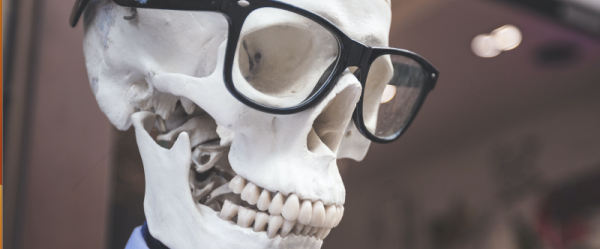Short answer: YES, you are at increased risk of low bone density if you have an eating disorder. This is also known as osteopenia or osteoporosis, depending on how low the density is.
If you’re the sort of person who skim-reads articles, you can probably stop here. Just take this information and check in with your doctor about whether or not you need to do any testing on your bones. For those with more time, let's look at the topic more closely...
Fast facts on bone density and eating disorders:
- Between 50 - 92% of females with anorexia nervosa had low bone density in some studies (Misra et al 2008, Grinspoon et al 2000).
- Up to 70% of males with anorexia nervosa have been found to have low bone density in one study (Misra et al, 2008)
- Taking the oral contraceptive pill does not protect you against developing low bone density related to eating disorders (Mehler et al, 2008; Hay et al, 2014).
- If you are taking the oral contraceptive pill, you don’t actually menstruate... but it looks like you are. Many people don't notice they've stopped menstruating if they're on the pill.
- Bone density levels can start dropping within less than 1 year of developing a restrictive eating disorder (Winston et al 2008).
Why am I more at risk of getting low bone density if I have an eating disorder?
There are a few different pathways it can take. You could look at the details in a medical textbook, but here’s a super-simplified rundown:
- Low body weight causes hormones to drop, and this can lead to weaker bones.
- Low body weight leads to higher cortisol levels, and this can lead to weaker bones.
- Restrictive eating often means there's not enough calcium in the diet, and this can lead to weaker bones.
- Undernutrition during childhood/adolescence (ie, earlier-onset disordered eating) is a big risk. It means your skeleton was built with low hormones and probably not enough calcium intake.
OK, but my doctor would have told me if it was a problem, so why are you making me read this article?
My experience of working in this area is that doctors are very good at picking up low bone density levels in underweight females who have stopped menstruating (ie, they have amenorrhoea). That’s great… except it’s not taking into consideration that up to 95% of people with an eating disorder do not fit the description of being an “underweight female” (!).
People who often fall through the cracks with the above system include:
- Those with atypical anorexia nervosa
- Those who have a past-history of anorexia nervosa, but may now be presenting for treatment of a different eating disorder subtype.
- The many people who have a missed diagnosis of an eating disorder in adolescence
- Females who are on the oral contraceptive pill (who usually think they're still menstruating) who’s body weight is too low for their natural set-point, but not below the conventional medical cut-off used to determine “underweight” (this happens far more than you’d think)
Can I improve bone density levels if mine are low?
It depends on how low the levels have dropped and how old you are when you catch it. As always, the quicker you seek treatment for it, the more likely the outcome will be good (see Healthy Bones Australia for more on treatment options). The body generally has pretty good capacity to improve bone density until around 25 - 30 years of age. From that ago onwards, I still encourage people to work hard to improve capacity to stop levels from dropping further, which is just as important.
So take a moment to reflect on whether it's time to have a conversation around bone health, and if it is (or even if it MIGHT be) - don't delay!
References
Grinspoon S, Thomas E, Pitts S, et al. Prevalence and predictive factors for regional osteopenia in women with anorexia nervosa. Ann Intern Med 2000: 133; 790 – 794.
Hay P, Chinn D, Forbes D, et al. Royal Australian and New Zealand College of Psychiatrists clinical practice guidelines for the treatment of eating disorders. Aus NZ J Psych 2014:48(11); 977 – 1008.
Mehler PS, MacKenzie TD. Treatment of osteopenia and osteoporosis in anorexia nervosa: A systematic review of the literature. Int J Eat Disord 2008; 42(3): 195-201.
Misra M, Katzman DK, Cord J, et al. Bone metabolism in adolescent boys with anorexia nervosa. J Clin Endocrinol Metab. 2008; 93(3): 3029 – 3036.
Winston A, Alwazeer A, Bankart M. Screening for osteoporosis in anorexia nervosa: prevalence and predictors of reduced bone mineral density. Int J Eat Disord 2008; 41(3): 284 – 287.
Other Bloom Nutrition & Wellness articles you might be interested in:
How do I know if I'm binge eating?
Why would I want to speak to an eating disorders dietitian?
Get in touch with the Bloom Nutrition & Wellness team!
© 2023 Bloom Nutrition & Wellness. All rights reserved. Blog posts on the Bloom Nutrition & Wellness website provide information of a general nature only, and cannot and do not take the place of individualised advice from a qualified healthcare professional.



